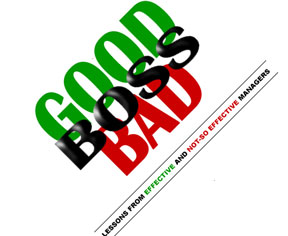How to be a great boss, and what are bad boss traits?
If you’re feeling unappreciated, uninspired and unhappy and you’re working for somebody else, who’s to blame? Findings of the Bad Boss Study, as well as an post in the Harvard Business Review blog, suggest it’s your boss’s fault.
The Bad Boss Study found that, in general, bosses leave their employees feeling unappreciated, uninspired, lonely and downright miserable. Before we evaluate who’s at fault, let’s review some of the study’s data. The below information was released by psychologist Michelle McQuaid, a leader in the field of positive psychology, and based on interviews with a cross section of a thousand U.S. workers:
- 64% of workers are unhappy in their job.
- 31% of employees feel uninspired and unappreciated by their boss.
- 15% are bored, lonely and miserable.
- 42% say their boss doesn’t work very hard.
- 20% indicate their boss has little or no integrity.
- 47% suggest their boss loses his or her cool under stress.
- 73% of those in their 20s and 30s say their health is at stake because of their relationship with their boss, and 40% of those 50 and older feel the same.
- 38% say their boss is great.
As you can see, the study indicates there are a plethora of bad bosses. (Are you nodding your head as you read this?) According to McQuaid, “This current situation … is costing $360 billion a year in lost productivity.”
If you’re an executive, manager, or supervisor, note that how to be a great boss, or what makes a good boss are the opposite of he characteristics of a bad boss.
Now, let’s get back to who’s at fault. I don’t think many people want or strive to have bad boss traits. As an executive coach, I haven’t met any. I think most leaders, managers and supervisors want to be either good or great bosses. And the entrepreneurs, managers and leaders who seek executive coaching generally learn how to be a great boss. So why aren’t more bosses in this study great? Why do only 38% make that grade?
Few folks who supervise, manage or lead received enough training in how to be good or great. If you haven’t been trained, then to a great degree, it’s not your fault. But if you know my work, and many of you who are reading this post do, you probably know what I’m about to say: If you recognize that you need training and your organization doesn’t supply it, you must find it outside of your organization. Either be the master of your destiny or victim to your own lack of initiative. Yes, it’s money out of your pocket, but the financial, emotional and relational ROI over your career will likely be phenomenal. It will also greatly enhance your job satisfaction because when you become a good boss at work, you become good or great at managing or leading, people will love working for you. And being more satisfied, happy and confident in your job as a result of additional training might also have a positive impact on your personal life (you are leaving work happy).
Here are six critical competencies on how to be a great boss and to consciously develop as a leader:
- Coaching others to be successful
- Building rapport
- Preventing and resolving conflict
- Running effective meetings
- Planning
- Being resilient
Notice that these are all skills you can learn and, in time, master.
And one more thing: If you want to be a great leader, you must have passion for what you do because passion is the fuel of greatness. People love to follow those who are passionate!
What do you think is the most important trait in someone becoming a bad boss? A great boss? Is it a trait we have listed, or some other trait?


